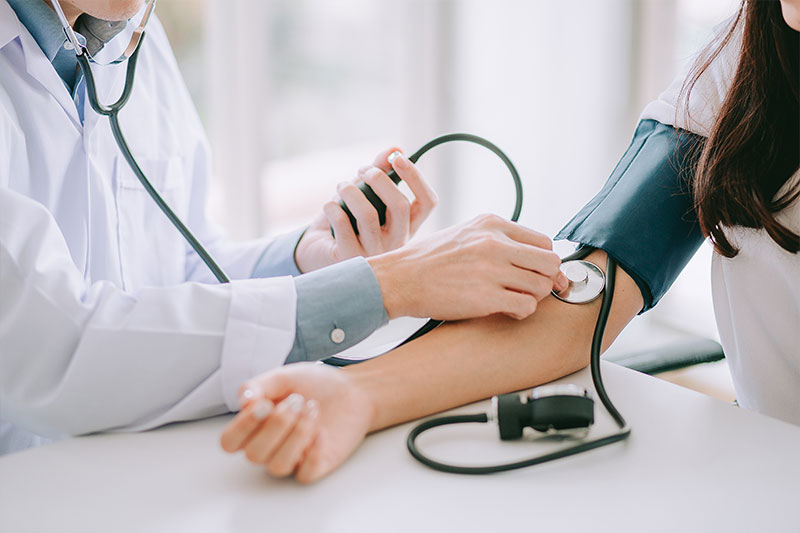Hypertension HT/ HTN, High Blood Pressure (HBP)
Blood pressure is a measure of pressure in the arteries during the rest and active phases of each heartbeat.
Systolic pressure: The number at the top in a blood pressure reading represents pressure your heart produces when blood flows through your arteries to the rest of your body.
Diastolic pressure: The number at the bottom in a blood pressure reading represents the amount of pressure in the arteries when the heart is a rest period between beats.
A blood pressure reading of 120/80 is considered normal.
Hypotension
Hypotension or low blood pressure is when the blood pressure reading is below 90/60.
Hypertension
Hypertension or high blood pressure or BP is a common condition in which the long-term force of the blood against artery walls rises high that eventually leads to ailments, such as heart problems.
Another name for Hypertension is “silent killer” because symptoms often do not appear, and it may cause damage to the cardiovascular system, which may go unnoticed on for years.
Stages of Hypertension There are three stages of Hypertension are:
In stage 1 hypertension, the numbers are in the range
- systolic:130–139 or
- diastolic: 80–89
In stage 2 hypertension, the numbers range between:
- systolic: 140 or higher
- diastolic: 90 or higher
In hypertension crisis, the range will be:
- systolic: 180 or higher
- diastolic: 120 or higher
Both hypertension and Hypotension cause disturbances in blood flow and brain cells, which lead to microvascular disease, stroke, cognitive decline, and dementia.
Symptoms of Hypertension
- Headaches
- Fatigue
- Nausea
- Vomiting
- Shortness of breath
- Blurred vision
- Anxiety
Types of High Blood Pressure
Primary Hypertension: Primary Hypertension develops slowly over the years, and there is no definite cause of the problem. Adults with a sedentary lifestyle are prone to have primary Hypertension sometime during their lifetime.
Secondary Hypertension: Secondary Hypertension is the kind of high blood pressure usually caused by an underlying condition. People with kidney disorders, fatty liver, thyroid problems, alcohol abuse, tumours, or sleep apnea may develop secondary Hypertension.
Hypertension and Anxiety
Hypertension can trigger feelings of anxiety in some people. Those with Hypertension may worry about their well being and future.
Sometimes, the symptoms of Hypertension, such as headaches, blurred vision, and shortness of breath, can be enough to cause panic or anxiety.
Regularly having high levels of anxiety, can cause damage to the heart, blood vessels, and blood kidneys as in the case of Hypertension
Risk factors
Hypertension has many risk factors that include:
Age: As age increases, the chances of high blood pressure will rise. Men are likely to develop Hypertension around the age of 45, while women may develop high blood pressure after the age of 65.
Family history: High blood pressure is usually hereditary. If Hypertension runs in your family, the chances are high that you may experience the same.
Obesity: Being overweight or obese leads to high blood pressure. More blood is required to supply oxygen and nutrients to the tissues if you are overweight. The extra amount of blood puts additional force on the blood vessels leading to pressure on artery walls.
Lack of physical activity: Leading a sedentary lifestyle and absence of physical activity increases the risk of Hypertension.
Smoking: Smokers are a high risk of developing high blood pressure. The chemicals present in tobacco harm the lining of artery walls leading to a rise in blood pressure. Eventually, the arteries are narrowed, increasing the blood pressure.
Excess sodium in your diet: Excess salt in the diet can cause the body to retain fluid, which increases blood pressure.
Less potassium in the diet: Potassium makes a balance of the amount of sodium in your cells. If you don’t consume enough potassium in your diet or retain enough potassium, Too much sodium may accumulate in the blood.
Less vitamin D in your diet: Vitamin D could affect an enzyme produced by kidneys that affects your blood pressure.
High consumption of alcohol: Excessive intake of alcohol can cause damage to the heart. Consuming more two drinks a day may affect blood pressure.
Stress: Blood pressure may temporarily increase due to high levels of stress. Some people try to relieve stress by eating, smoking, or drinking alcohol, which could raise problems with high blood pressure.
Chronic conditions: People suffering from kidney disease, diabetes, or sleep apnea are at a high risk of developing Hypertension.
Uncontrolled high blood pressure can lead to:
- Heart attack/myocardial infarction or stroke.
- Aneurysm
- Heart failure
- Weak and narrow blood vessels in kidneys
- Metabolic syndrome.
- Mental health problems
In cases of mildly elevated blood pressure, some lifestyle modifications may be beneficial, although often not enough:
- Avoiding alcohol
- Reduction of salt intake
- Regular physical activity
- Weight loss
- No smoking
In case the above changes are not productive, the patient may need daily medications to keep their blood pressure in the normal range to prevent any damage to their organs.
Depending on the level of blood pressure elevation, a combination of blood pressure medications often is needed to control Hypertension.





